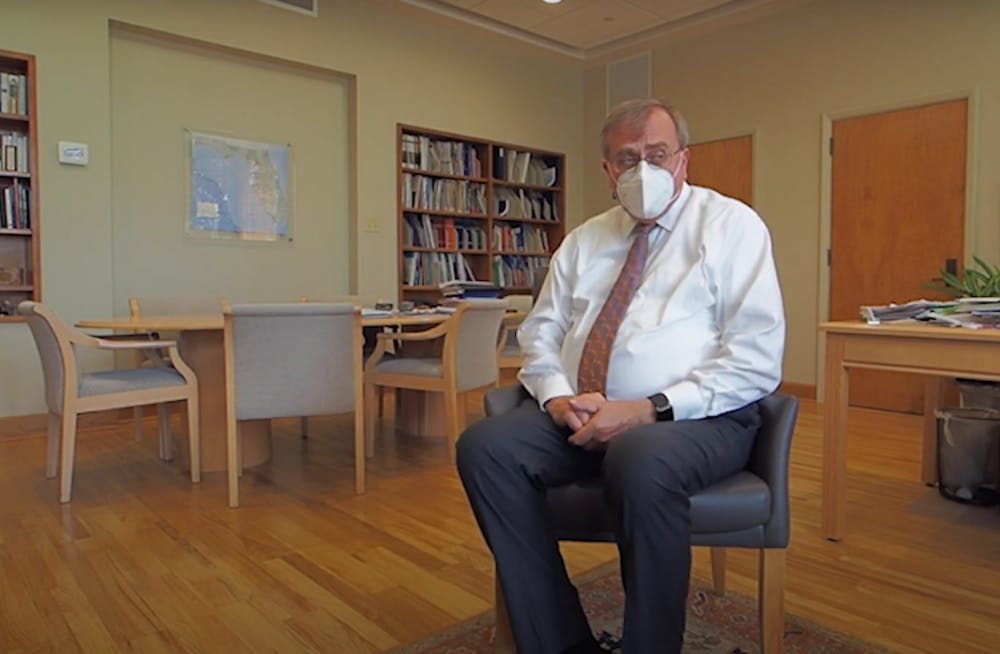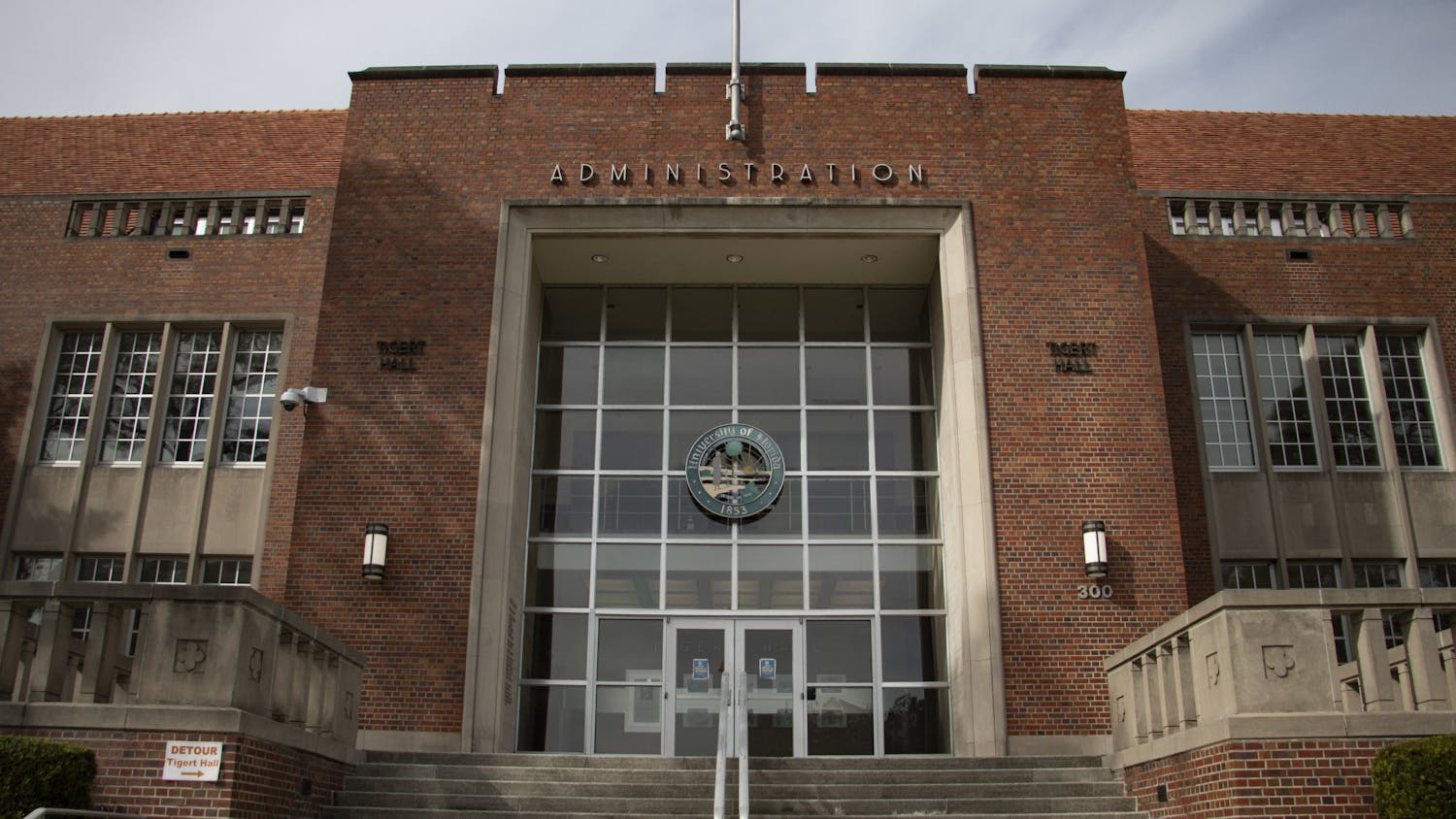
UF President Kent Fuchs during an interview with The Alligator in Fall 2020.
UF President Kent Fuchs talked about his plans to steer the university away from virtual classrooms next semester — from behind a Zoom screen.
Just before Thanksgiving Break, UF President Kent Fuchs reflected on a Fall semester that’s approaching its final stretch.
“I have been immensely proud of the university and how our students and our staff and our faculty have all adjusted,” he said, diplomas and family photos filling up his background.
But not all in the campus community agree that 5,293 cases since March 18, the second most of any university in the nation, amounts to functioning with COVID-19.
Fuchs challenged the university to make this academic year the best ever on Aug. 28. Nearing the halfway mark, he faces questions and backlash over the feasibility of HyFlex classes, the health of faculty and students and a Spring semester with no Spring Break.
For as difficult as Fall has been, Fuchs believes Spring will be even more challenging. In preparation, he’s consulted with UF Health experts and state officials while also accelerating plans to outfit classrooms with needed technology.
“We believe we know how to do this,” Fuchs said. “I’m certain we do.”
To reach administrators’ goal of offering the same number of in-person classes as were offered last Spring semester, face-to-face courses will be taught in a HyFlex method, in which professors will teach to both in-person and online groups. Almost 4,700 in-person classes were taught in Spring 2020.
Fuchs said there was no formal survey gauging student interest in face-to-face classes, but constant emails from students and parents asking for an in-person option helped solidify UF’s plans. He said students who’ve struggled to learn virtually deserve other options.
“It’ll be more difficult,” Fuchs said. “But I believe it will provide a richer set of opportunities for students.”
However, many professors feel like their health and that of their families are being put at risk.
United Faculty of Florida-UF and Graduate Assistants United-UF, faculty and graduate student unions, have objected to the Spring plans since they were announced in October. Members from both unions protested outside President Fuchs’ on-campus house on Nov. 1 and created a petition rejecting in-person classes for the Spring, which has over 3,300 signatures as of Sunday.
Fuchs said he empathizes with these concerns but believes UF has the ability to deliver these classes safely. He thinks student and faculty attitudes toward in-person classes are a mixed bag, with no one prevailing opinion.
“There are also faculty who very much had been eager to get into the classroom and have not been able,” Fuchs said.
At the beginning of the Fall semester, students coming back to Gainesville helped contribute to 1,971 confirmed COVID cases at UF in September. Fuchs has faith in UF’s Spring plan but acknowledged the likelihood of a similar spike in cases in January and February.
“There’s gonna be more COVID in our community, in our state, in our nation, likely than we’ve ever had,” Fuchs said.
Fearing the effects of such a spike, 181 faculty members have received COVID-19-related accommodations for the Spring through the Americans with Disabilities Act. Of those, 78 will be allowed to teach remotely, with the rest being provided “enhanced classroom safeguards” like face shields and N95 masks.
Fuchs believes these accommodations will be sufficient. Many professors disagree.
“I’m certainly appreciative of anyone that is concerned about their own health or the health of others,” Fuchs said.
Faculty’s concerns don’t stop at health and safety either.
Fuchs addressed backlash over the UF Board of Trustees passing an amendment giving the university the ability to enact furloughs, stressing the administration has no immediate furlough plans.
“To achieve the goals we have for the institution, which is to be thought of worldwide as one of the top five best public research universities, we can’t shrink our people,” Fuchs said. “We have to grow our people.”
The main personnel change in response to the pandemic was a hiring pause, he said. Another employment effort was UF keeping residence hall staff on payroll even with students away from campus over the summer.
Faculty and students have expressed concern over whether HyFlex classes will provide an adequate educational experience and whether professors will be able to make the adjustment.
To adapt to HyFlex, Fuchs recommends faculty take advantage of resources UF offers on teaching more effectively, both online and in-person, though he’s deferring to specific departments and professors on how they should best handle the actual running of the class.
“I’m not teaching myself, and so I try to not tell the faculty how to teach or how to do it better,” he said.
The HyFlex method was implemented in Alachua County Public Schools this semester with mixed results, with teachers speaking out at school board meetings about the difficulty of splitting the focus between in-person and online students.
Ahead of Thanksgiving Break, Fuchs also touched on UF’s decision to cancel Spring Break this year in favor of extending Winter Break by a week.
Part of what contributed to Fuchs’ reasoning are memories of Spring Break in 2020, when UF, which had one of the earliest Spring Breaks in the nation, saw COVID-19 first hit Gainesville as students came rushing back to campus, causing Fuchs to announce a switch to online classes on March 11, just two days after the semester resumed.
With no break, Fuchs said the Counseling and Wellness Center will inform students and the rest of the UF community how to take care of their mental wellness. As students express frustration with long wait times at the CWC, President Fuchs implored them to reach out to him directly if they have problems.
“There is now, and there will be, extra mental stress and strain,” he said.
Fuchs said seeing a potential COVID-19 vaccine on the horizon will alleviate some stress that’s been brought on by the pandemic as pharmaceutical companies like Pfizer and Moderna make progress.
As the Zoom call came to a close, Fuchs said he looks forward to being interviewed a year from now about UF football’s national championship or the university’s Nobel Peace Prize win. Basically anything except the effects of a year that has left 266,000 Americans dead from COVID-19.
“It may be when we look back a couple years, three years, four years, that we’ll say ‘Yep, that was a really good year. That was one of the best years,’” he said.





